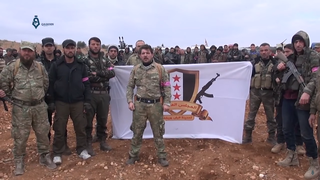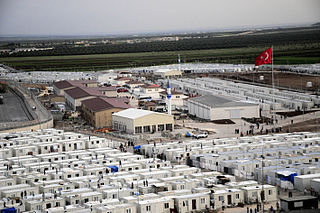Related Research Articles

Xenophobia is the fear or dislike of anything that is perceived as being foreign or strange. It is an expression that is based on the perception that a conflict exists between an in-group and an out-group and it may manifest itself in suspicion of one group's activities by members of the other group, a desire to eliminate the presence of the group that is the target of suspicion, and fear of losing a national, ethnic, or racial identity.

Lesbian, gay, bisexual, transgender, and queer (LGBTQ) people in Turkey face legal challenges not experienced by non-LGBTQ residents, though the overall situation is considered to be less repressive when compared to most other Muslim-majority countries.
The article describes the state of race relations and racism in the Middle East. Racism is widely condemned throughout the world, with 174 states parties to the International Convention on the Elimination of All Forms of Racial Discrimination by April 8, 2011. In different countries, the forms that racism takes may be different for historic, cultural, religious, economic or demographic reasons.

The Syrian civil war is an ongoing multi-sided conflict in Syria involving various state-sponsored and non-state actors. In March 2011, popular discontent with the rule of Bashar al-Assad triggered large-scale protests and pro-democracy rallies across Syria, as part of the wider Arab Spring protests in the region. After months of crackdown by the government's security apparatus, various armed rebel groups such as the Free Syrian Army began forming across the country, marking the beginning of the Syrian insurgency. By mid-2012, the insurgency had escalated into a full-blown civil war.

In Turkey, xenophobia and discrimination are present in its society and throughout its history, including ethnic discrimination, religious discrimination and institutional racism against non-Muslim and non-Sunni minorities. This appears mainly in the form of negative attitudes and actions by some people towards people who are not considered ethnically Turkish, notably Kurds, Armenians, Arabs, Assyrians, Greeks, Jews, and peripatetic groups like Romani people, Domari, Abdals and Lom.

The Solution process, also known as Peace process or the PKK–Turkish peace process, was a peace process that aimed to resolve the conflict between the Turkey and PKK as part of the Kurdish–Turkish conflict (1978–present). The conflict has been ongoing since 1984 and resulted in some 40,000 mortal casualties and great economic losses for Turkey as well as high damage to the general population.

Local elections were held in Turkey on 30 March 2014, with some repeated on 1 June 2014. Metropolitan and district mayors as well as their municipal council members in cities, and muhtars and "elderly councils" in rural areas were elected. In light of the controversy around the elections, it was viewed as a referendum on the government of Prime Minister Recep Tayyip Erdoğan. About 50 million people were eligible to vote.
Syrians in Lebanon refers to the Syrian migrant workers and, more recently, to the Syrian refugees who fled to Lebanon during the Syrian Civil War. The relationship between Lebanon and Syria includes Maronite-requested aid during Lebanon's Civil War which led to a 29-year occupation of Lebanon by Syria ending in 2005. Following the outbreak of the Syrian Civil War, refugees began entering Lebanon in 2011.

Turkey's involvement in the Syrian civil war began diplomatically and later escalated militarily. Initially, Turkey condemned the Syrian government at the outbreak of civil unrest in Syria during the spring of 2011; the Turkish government's involvement gradually evolved into military assistance for the Free Syrian Army in July 2011, border clashes in 2012, and direct military interventions in 2016–17, in 2018, in 2019, 2020, and in 2022. The military operations have resulted in the Turkish occupation of northern Syria since August 2016.

Eren Erdem is a Turkish writer and politician from the Republican People's Party (CHP), who has served as a Member of Parliament for İstanbul since 7 June 2015.

The Turkish Armed Forces and its ally the Syrian National Army have occupied areas of northern Syria since August 2016, during the Syrian civil war. Though these areas nominally acknowledge a government affiliated with the Syrian opposition, in practice they constitute a separate proto-state under the dual authority of decentralized native local councils and Turkish military administration.

Syrians in Turkey, includes Turkish citizens of Syrian origin, Syrian refugees, and other Syrian citizens resident in Turkey. As of December 2024, about 3 million registered refugees of the Syrian Civil War reside in Turkey, which hosts the biggest refugee population in the whole world. In addition, about 75,000 Syrian nationals reside in Turkey with a residence permit. Apart from Syrian refugees under temporary protection and Syrian citizens with a residence permit; 238,768 Syrian nationals acquired Turkish citizenship as of August 2024.

The Good Party is a nationalist and Kemalist political party in Turkey, established on 25 October 2017 by Meral Akşener. The party's name and flag is a reference to the tamga of the Kayı tribe.

Refugees of the Syrian civil war in Turkey are the Syrian refugees fleeing the Syrian civil war. The Republic of Turkey hosts over 3.7 million registered refugees.
In Turkey, while most instances of anti-Arab sentiment have been directed at Syrian refugees, the phenomenon has more recently grown to include other Arabs, such as those from the Gulf countries. The country's far-right politics frequently consist of discourse portraying the Syrians and other Arabs as a backwards and uncivilized force afflicting the Turks. Rising levels of anti-Arab sentiment have also been attributed to the Turkish economic crisis. Additionally, it is also rooted in Turkey's migrant crisis, which began alongside the Arab Spring; the Turkish government had documented 3.7 million Syrians as refugees by 2018. That same year, the United Nations reported that 63.4% of all registered Syrian refugees in the world were in Turkey. A number of Turkish politicians have been critical of the large Arab presence in the country since the beginning of the Syrian Civil War.
Anti-Chechen sentiment, Chechenophobia, anti-Chechenism, or Nokhchophobia, refers to fear, dislike, hostility, hatred, discrimination, and racism towards ethnic Chechens, the Chechen language, or the Chechen culture in general. Anti-Chechen sentiment has been historically strong in Russia, and to some degree has spread to other countries in the former Soviet Union, such as Azerbaijan, to Europe, the Middle East, and to the United States. For decades, the main causes of hatred against Chechens have been largely due to the created narrative which depicts a violent mentality of Chechens, the association of Chechens with Islamic extremism, and Russian imperialist propaganda targeted at Chechens.

Altındağ Incidents is a protest that took place on 10 August 2021 in Battalgazi neighbourhood of Altındağ district of Ankara, as a result of a quarrel between a Syrian group and 2 young people, and the Syrian group stabbed 2 Turkish young people. As a result of the incident, one of the young people lost his life and 2 people were detained. After this incident, crowded activist groups organized marches. These groups attacked the houses and shops of Syrians. Riot police and riot police were deployed to the tense areas. According to Ankara Security Directorate, 148 people were detained for their involvement in the incidents in Altındağ.
The Victory Party is a right-wing to far-right, ultranationalist, anti-immigrant political party in Turkey founded on 26 August 2021 under the leadership of Ümit Özdağ. Party's emblem depicts a torch, its fire being shaped like a crescent and a star. Party was represented in the Grand National Assembly by a single MP, Özdağ himself, until it failed to pass the electoral threshold in the 2023 election and therefore was barred from any seats.
Turkish–Islamic synthesis is a type of Turkish nationalism which has an Islamist leaning instead of secular.
In early July 2024, Turkey experienced a surge of anti-Syrian riots driven by anti-refugee sentiment. Caused by the molestation of a young girl, riots began in Kayseri, and spread across Turkey.
References
- ↑ "Suriyeli algısı: "Irkçılık kalıcı oldukları anlaşıldığında arttı"".
- ↑ "Suriyelilere nefret kampanyası". www.cumhuriyet.com.tr (in Turkish). 22 July 2019. Retrieved 2022-04-13.
- ↑ Tokyay, Menekse (2020-06-12). "Araştırma: İstanbullular Suriyeli komşularından 'endişeli'". euronews (in Turkish). Retrieved 2022-04-13.
- 1 2 "SURİYELİ MÜLTECİLER KRİZİ VE TÜRKİYE SONU GELMEYEN MİSAFİRLİK" (PDF) (in Turkish). Archived from the original (PDF) on 2018-07-29. Retrieved 2022-04-13.
- 1 2 "Growing Anti-Syrian Sentiment in Turkey | The Washington Institute". 2021-01-25. Archived from the original on 2021-01-25. Retrieved 2022-04-13.
- ↑ "Araştırma: İstanbul'da Suriyeli sığınmacılara yönelik tehdit algıları kemikleşiyor | Euronews". 2020-06-18. Archived from the original on 2020-06-18. Retrieved 2022-04-13.
- ↑ "Türkiye'deki Suriyeliler: Gidenler ve kalanlar ne düşünüyor, onları istemeyenler ne diyor? - BBC News Türkçe". 2019-02-10. Archived from the original on 2019-02-10. Retrieved 2022-04-13.
- ↑ "Syrians in Turkey continue to face rise in discrimination | Al Arabiya English". 2021-08-19. Archived from the original on 2021-08-19. Retrieved 2022-04-13.
- 1 2 "Abuses against Syrians in Turkey: Fueled by hate speech, amplified by propaganda – Syria Direct". 2021-03-30. Archived from the original on 2021-03-30. Retrieved 2022-04-13.
- ↑ "Türkiye'de yaşayan Suriyelilerin ayrımcılıkla mücadelesi | TÜRKİYE | DW | 20.06.2019". Deutsche Welle . 2019-06-21. Archived from the original on 2019-06-21. Retrieved 2022-04-13.
- ↑ "Yılbaşı kutlamalarıyla gündeme gelen Suriyeliler ve nefret söylemi | Euronews". 2019-01-05. Archived from the original on 2019-01-05. Retrieved 2022-04-13.
- ↑ "En Büyük Kaygıları Irkçılık ve Ekonomik Koşullar". Amerika'nin Sesi | Voice of America - Turkish (in Turkish). 20 June 2021. Retrieved 2022-04-13.
- ↑ "Irkçılık ilkokula indi: Suriyeli çocukların öğretmenleri 'çaresiz'". Archived from the original on 2019-07-24. Retrieved 2022-04-13.
- ↑ "Suriyelilere 'plaj' yasağı - Son Dakika Flaş Haberler". 2019-07-24. Archived from the original on 2019-07-24. Retrieved 2022-04-13.
- ↑ "Gazipaşa'da Suriyeli sığınmacılara yönelik plaj yasağı reddedildi - Güncel haberler". 2019-07-24. Archived from the original on 2019-07-24. Retrieved 2022-04-13.
- ↑ "İzmit'te "ırkçı pastane" iddiaları Kocaeli Haber". 2019-07-24. Archived from the original on 2019-07-24. Retrieved 2022-04-13.
- ↑ "Ankara Altındağ'da Suriyelilerin ev ve işyerleri tahrip edildi". www.cumhuriyet.com.tr (in Turkish). 13 August 2021. Retrieved 2022-04-13.
- ↑ "Beşiktaş tribünlerinden "Ülkede mülteci istemiyoruz" sloganları atıldı". T24 (in Turkish). Retrieved 2022-04-13.